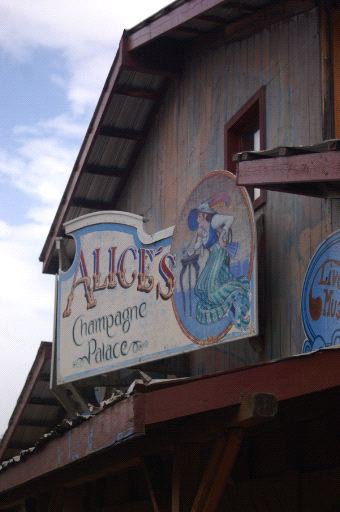Editor’s note: With 2014 marking the Homer News’ 50th anniversary, it’s the perfect time to look at Homer’s past. Alice’s Champagne Palace is a local business with roots predating the News.
On Sunday, with shouts of Super Bowl fans echoing from the rafters, the smell of food lingering in the air and spilled beverages drying on the floor, the doors of Alice’s Champagne Palace were closed.
Whether the closure is permanent is a question only the owners, the English Bay Corporation, can answer. It’s a question on which EBC board president Don Emmal prefers not to comment.
According to a story in the Homer News, Sept. 2, 1976, Alice’s began as the Club Bar, which began as a café in 1946, operated by Freda Coles. Her partners, Ken and Hazel Heath, took over its operation, selling the café to Sam and Goldy Gasperac in 1955. The Gasperacs converted it into a bar.
Ask people who lived here during that time about the business’s early days and its significance as a landmark becomes evident.
“I can remember Al Heady was building that hotel when we were kids, about 1945 or 1946, maybe 1947, and they built the bar and restaurant shortly after the hotel opened,” said Bill Kranich, now an Anchorage resident, referring to construction of what is now the Heritage Hotel.
Wilma Williams had memories of the Club Bar dating back to the mid 1950s.
“Every time I went into the Club Bar, my dog Blackie sat on the front porch and told everyone where I was at,” said Williams, laughing. She described the bar as a “get-together” place where a lot of business was done.
Another long-time Homerite pegged the Club Bar to an even earlier time.
“All I can tell you is that it was in existence when I came in 1949,” said Margaret Anderson. “Before that, I don’t know.”
In 1968, Alice Cochrane purchased the Club Bar from the Gasperacs, according to Cochrane’s son, Tim Mellen, who was 11 at the time.
“We lived in Portland, Ore., and she loaded up her Cadillac and drove on up. The rest of us followed in 1970, 1971,” said Mellen.
During the years Cochrane owned the Pioneer Avenue business, Mellen and his sisters helped keep it going.
“All my sister worked there as bartenders at one time or another and I was a janitor of sorts every once in awhile,” he said.
In 1975, the traveling bug bit Cochrane and she put the business up for sale. Billie Bedsworth took over and, the following year, a fire that began in the basement, destroyed the building.
“Bartender Jeanette Jenkins, who had been hired only five days earlier, managed to save the night’s cash,” the Homer News reported on Sept. 2, 1976.
The new Club Bar was constructed by Marvin Collins, nicknamed “Marvin the Architect,” and the oak serving bar was built by Olga von Ziegesar, according to Larry Smith, who worked on the building. Smith recalled that opening night almost brought the business to a close.
“It’s a good thing the people that built it were working partly for beer. They showed up for their beer pay and people were dancing and the floor started to shudder and shake,” said Smith. “The dancing beer-paid carpenters went underneath and shored it up.”
The reopening also marked one of the business’s most colorful chapters. Bedsworth hired artist Brad Hughes to design a sign for the new building. Drawing upon a “rising like the Phoenix” theme, the sign depicted a Phoenix and two nude figures. Kept under wraps until the New Year’s Eve opening, the design quickly sparked a negative reaction among some locals.
Learning of the objections, Bedsworth agreed to cover portions of the painting. After someone removed the coverings, however, paint was thrown on the sign. Letters were written, people took sides, it became a hotly contested topic at a city council meeting and, saying she didn’t want to be a catalyst for controversy, Bedsworth again covered the painting.
During the next few years, the business passed through several hands, returning more than once to Cochrane. In 1980, during one of those periods when she was in charge, the name was changed from the Club Bar to Alice’s Champagne Palace.
“She got it back three times before she finally sold it to Dave and Trudy Ritchie in 1998,” said Mellen.
In 2007, after Alice’s had been closed for several years, the Ritchies sold the business to the English Bay Corporation. That same year, Daniel Norton was hired to work at Alice’s as a bartender and has, over the years, amassed his own collection of Alice’s stories from his side of the bar.
“There’s a lot I can’t really talk about, especially not mentioning the people involved,’ said Norton, maintaining the confidence for which bartenders are famous.
What he can discuss is Alice’s importance for area residents.
“It’s been so much more than a bar and restaurant,” said Norton. “It’s been a community meeting place, a place for fundraisers, weddings, parties, meetings, whatever.”
Last November, word began to spread of English Bay Corporation’s plans to close the business.
“It’s a shame because we got it up to where they asked us to get it to, we have an awesome staff that I was really, really happy with and things were looking really bright for us and they decided to sell,” said Cindy Burns, who has managed Alice’s for five years.
Last week, a three-day wrap-up brought the current incarnation of Alice’s to an end. Friday was a “Good Friday Last Supper” potluck dinner; Saturday was a closing luau beach party and Sunday was the Super Bowl Blowout Party.
“People are really going to miss it,” said Norton of Alice’s. “Not just me because I’m losing a job I love, but people who go there literally every day. It filled a space that’s much needed.”
McKibben Jackinsky can be reached at mckibben.jackinsky@homernews.com.


